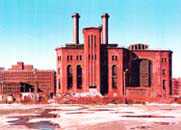Creating an arts district in downtown Jersey City must begin with a redevelopment plan, according to city officials.
Based on the findings of an independent organization, the Urban Land Institute, Jersey City officials want to turn a portion of the city presently occupied by former warehouses and factories into a vibrant arts and entertainment district. Naming the area the Powerhouse Arts District, the study suggests using the Powerhouse – a building that used to be a power source for area underground railroads – as a starting point for establishing a viable arts community.
“The goal is to create an arts and entertainment district in that whole eight blocks – plus the Powerhouse,” said Charles Kessler, a community activist who has worked with city officials on bringing the ULI on board and implementing their suggestions.
Putting this vision in effect, the City Council passed a resolution at the last Council meeting that allows the Department of Housing, Economic Development and Commerce to conduct a study to determine if a redevelopment plan is needed for the area. By having a redevelopment plan, the city can create special zoning restrictions to be followed in that area. This establishes guidelines for developers who own property in the area. In addition, a redevelopment plan allows the city to transfer city-owned property to the autonomous Redevelopment Agency. This agency can sell land to developers without having a public bidding process, giving the agency the power to select developers based on their plans.
“The plan will cover the whole district, writing what’s allowed and what’s not allowed,” Kessler said. “As long as the arts part is covered, I’m not worried about it.”
Bounded by Washington Street and Marin Boulevard from Second to Steuben streets, the area is in the shadow of Jersey City’s waterfront development and the site of the work-and-live-overlay (WALDO) ordinance that has so far failed to anchor an arts community in the region. Although Mark Munley, director of the HEDC, supplied a map of the area to be studied, he said that the final redevelopment borders would be determined after the study, possibly pulling away sections of other redevelopment plans.
If the city pursues the current vision for the area, then downtown Jersey City would house retail arts and crafts shops, galleries, and a visible presence of artists living in the community.
Plans for the Powerhouse
The ULI study proposes various uses for the Powerhouse, recommending that is developed to represent the future vision of the area. David DeSimone, a real estate developer who has restored theaters in Pittsburgh, Penn., suggested that the renovated Powerhouse include space for a “state-of-the-art black box” performance venue.
Alan Folks, an architect, thought the brick-and-steel structure on First Street should house public and private ventures.
The Redevelopment Agency has picked a Philadelphia-based firm to renovate the structure that has experience readapting industrial buildings. The city would sell the building to a developer, who, in turn, must promise not to sell it when it is finished with the renovations. Because the city jointly owns the Powerhouse with the Port Authority, it must receive permission to move forward with its plans first.
Mayor Glenn Cunningham said that the city owns 70 percent and should be able to convince the Port Authority that it is in everyone’s best interest to allow the city to designate a developer.
Residences for artists
Although a definite plan for guaranteeing housing for artists has not been adopted, the theme has survived. Cunningham said that he supports creating an ordinance that guarantees a certain percentage of new buildings would be set aside for working artists.
While city officials expressed an interest in providing a portion of affordable housing for working artists, Kessler said that the majority of reserved housing for artists would most likely be rented or sold at market rate.
